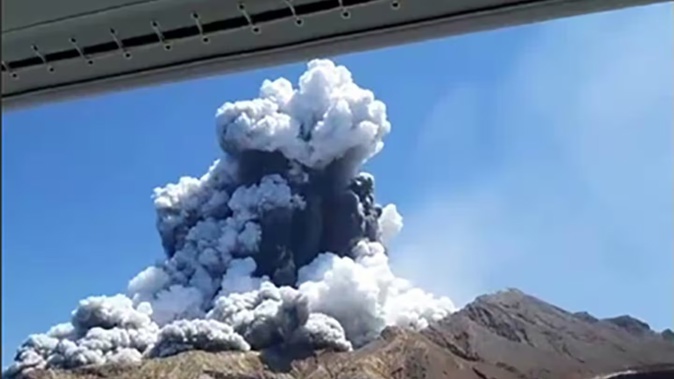
A bereaved family member who lost a loved one in the Whakaari White Island disaster said part of her died when her relative was killed in the eruption.
“Grieving never goes away,” she said this morning at the second day of phase one of the Whakaari-White Island Eruption Coronial Inquest.
The Bay of Plenty volcano, off the coast of Whakatāne, erupted on December 9, 2019, killing 22 people and seriously injuring 25.
Coroner Marcus Elliott today warned that the subject matter explored at the hearing in the Newmarket Court Hearing Centre will be “confronting”.
“Always bear in mind the pain and the loss, resulting from that day, and the impact it had on everyone involved,” he said.
This phase of the inquest will look at issues including the emergency response, issues relating to those left on the island, and the cause of deaths.
The second phase will address regulatory oversight of tours to Whakaari, risk mitigation, possible actions following risk increases and communication of risk.
Comments and recommendations will also be made in phase two.
‘There will be no new memories’
The bereaved family member today told the hearing she carried the loss of her relative every day.
Part of her, she said, died when they died.
The woman said she had so many unanswered questions, especially for the tourist operators.
“I hope these questions can be answered through the inquest.”
Coroner Marcus Elliott is presiding over the inquiry. Photo / Michael Craig
Suppression orders mean both the woman and her relative cannot be named.
Tears fell as she stood delivering her statement.
“The real impact and consequences of the eruption is that there will be no new memories [with her relative].”
Her comments brought to an end the personal statements from survivors in the opening of phase one of the inquest.
Anna Pollet, counsel for the New Zealand Police, stated that there were issues related to communication during the response.
She said these were due to the remote area where the eruption occurred, technical communication delays with Hato Hone St John and the use of police cellphones reducing the amount of information received over radio.
She said the communication delays with Hato Hone St John resulted in coordinates that were different between the emergency organisations’ systems.
The decision by St John to set up base at the Whakatāne Airport when patients were arriving at the port was something Pollet said she would not comment on, but told the inquest it would be something to explore.
Pollet said that those involved in the response were doing their best with the resources available to them.

An aerial view of White Island after the volcanic eruption. Photo / George Novak
Craig Stevens, for Hato Hone St John, said the triage centre was set up at the airport because of the number of patients with complex burns and the need for them to be distributed nationally.
Stevens said experienced front-line staff were and remain profoundly impacted by what they encountered by the incident.
He said the event was “unparalleled” in terms of burn injuries and staff worked “tirelessly” throughout.
For the impacted families, he said: “Any mortality is devastating and has profound and lasting impacts.”
Health New Zealand Te Whatu Ora (HNZ) lawyer Dr Jonathan Coates said the medical response to the eruption was “extraordinary”.
He thanked the families for their acknowledgement of the medical staff’s work and said no Health NZ staff had their conduct in the response called into question.
This phase of the hearing is expected to last six to eight weeks.
Media are subject to extensive suppression orders and hearing updates can only be shared at the lunch adjournment and after each day’s session ends.
Katie Harris is an Auckland-based journalist who covers issues including sexual assault, workplace misconduct, media, crime and justice. She joined the Herald in 2020.
Take your Radio, Podcasts and Music with you









